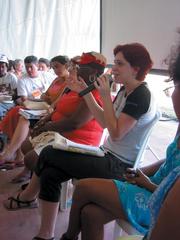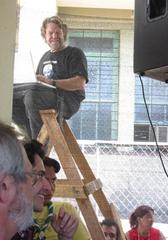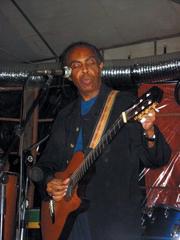The Monthly GNU Column
Brave GNU World
By Georg C.F. Greve
The Monthly GNU ColumnBrave GNU WorldBy Georg C.F. Greve |

|
Welcome to another issue of Brave GNU World, written in sunny S‹o Paulo this time, shortly after my trip to the World Social Forum in Porto Alegre.
Last month we discussed spam and ways of fighting it. I identified some tools that can help control the flood of unsolicited messages.
Mbox-Cleaner [5] by Oliver Bandel is another tool for managing mail. It removes duplicates from an Mbox-formatted mailbox. To remove duplicates, Mbox-Cleaner compares the message content and simply keeps one copy if the content is identical. On a Powerbook G4 with a 400MHz CPU, the software took about four seconds to parse a 9 MByte file. That is powerful performance for a tool implemented in a scripting language.
Oliver had the idea for Mbox-Cleaner when working with the Ocaml [6] scripting language and trying to get better acquainted with Ocamllex tools. He recalled a Perl script he had once written to split up an Mbox file into multiple files with a single message in each file. Oliver decided to re-implement the script in Ocamllex, and another user requested an extension that searched the files, deleted duplicates, and put the results back together to form a single Mbox file.
Mbox-Cleaner can read from standard input and write to standard output. You can therefore add it to a pipeline as a filter. Integrating an improved spam detection mechanism is at the top of the to-do list.
Because so many people were interested in his script, Oliver decided to publish it as free software under the General Public License (GPL). After cleaning up the code in January 2005, he sent a note to Brave GNU World.

For anyone who missed the topic last month: blacklists are lists of IP addresses for possible spammers. Some mail servers refuse to accept messages from a sender whose name is on a blacklist. Other servers automatically tag the message as spam. Some go so far as to refuse to communicate with any dynamically assigned IP addresses - that is, with most users who use a service provider for Internet access.
Blocking dynamic addresses mainly hurts innocent bystanders, as spammers often use computers with dynamic addresses without the actual owner knowing. As a countermeasure, many users suggest using the Internet provider's Smarthost and thus avoiding issues concerning the blacklisting of dynamic IP addresses. As the provider's central mail service, the Smarthost will typically have a static IP address.
The US baseball legend Lawrence Peter "Yogi" Berra http://www.yogi-berra.com once said, "In theory there is no difference between theory and practice. In practice, there is." The sportsman, who is famous for his unforgettable quotes, definitely has a point: in practical applications, the Smarthost approach has a few drawbacks. First of all, many users, especially those who have free operating systems such as Linux or BSD, do not have a Smarthost. Secondly, blacklists are full of mistakes and many of them list static IP addresses as dynamic addresses.
Last year at a conference in Geneva, the representatives of a small developing country stated that a single national provider had a monopoly on Internet access in their country. When an attacker hijacked the central mail server and used it to distribute spam, the server soon ended up on all kinds of blacklists, and this led to 90 percent of domestic mail users losing their ability to communicate with the outside world.
It took a while for the victims to realizes the full extent of the issue and the cause. When the administrators finally attempted to remove their server from the blacklists, they were not entirely successful. In some cases, the blacklist maintainers didn't seem to believe the administrators. The government asked an interesting question: What right has an IT engineer in a foreign country to punish a whole country for the misdeeds of a third party? Why wasn't the country given a chance to resolve the issue or at least issue a statement?
Blacklists lead to perplexing problems even assuming benevolent and correct use. Under practical conditions, education information and communication are a far superior long-term alternative in the battle against spam.

The 5th World Social Forum (WSF) generated some understanding for issues of this kind. The Forum again took place in January in Porto Alegre, Brazil, and again was dedicated to free software [7].
The Projeto Software Livre Brasil (PSL-Brasil) organized a series of events on freedom of knowledge and software, in which the Free Software Foundation Europe [8] also participated. Among the speakers were Professor Lawrence Lessig of Creative Commons fame, John Perry Barlow, Electronic Frontier Foundation (EFF), SŽrgio Amadeu da Silveira, the President of the Brazilian Institute for Information Technology, as well as Gilberto Gil, Brazil's Minister for Culture and a famous musician.

Topics included the foundations of free software, the global, political perspective at United Nations level, and the consequences that free software has for other civil societies.
At one of their own events, the organizers introduced the concept of the 6th Fórum Internacional Software Livre (FISL, [9]) in Porto Alegre. The forum will be taking place June 1 through 4, 2005 at the same location. The Free Software Forum is definitely one of the three most interesting events for activists from the free software scene. To publicize the event, the participants marched in the World Social Forum parade wearing their new t-shirts and distributing flyers. The parade was an enormous affair with some 200,000 participants.
There was a lively exchange with other groups and organizations at the more topic-specific events, such as the working group for women, which is supporting equality projects world wide. Fernanda Weiden and Loimar Vianna reported on the "Women in Free Software" project and about their experiences with feminist telecentros in Porto Alegre, as well as the first conference in this vein during the 5th Free Software Forum in June 2004.
One of the highlights of the World Social Forum was the contribution by the Brazilian Ministry of Culture on the topic of culture and Creative Commons. After a short interruption, accompanied by intensive discussions on the problems of the radio scene, Gilberto Gil - Brazil's Minister of Culture and one of the most popular musicians in the country - picked up a guitar and played some of his own songs - an excellent event for everyone in the audience.
| INFO |
|
[1] Send ideas, comments, and questions to Brave GNU World: column@brave-gnu-world.org [2] GNU project homepage: http://www.gnu.org/ [3] Georg's Brave GNU World homepage: http://brave-gnu-world.org [4] "We run GNU" Initiative: http://www.gnu.org/brave-gnu-world/rungnu/rungnu.en.html [5] Mbox-Cleaner download: ftp://www.belug.org/new/user/ob/Programs/Tools/mbox-cleaner/ [6] Ocaml homepage: http://www.ocaml.org [7] 5th World Social Forum: http://www.forumsocialmundial.org.br [8] FSFE at WSF: http://www.germany.fsfeurope.org/events/2005/wsf-brazil/wsf-brazil.en.html [9] 6th Fórum Internacional Software Livre: http://fisl.softwarelivre.org/6.0/index.php?language=en |